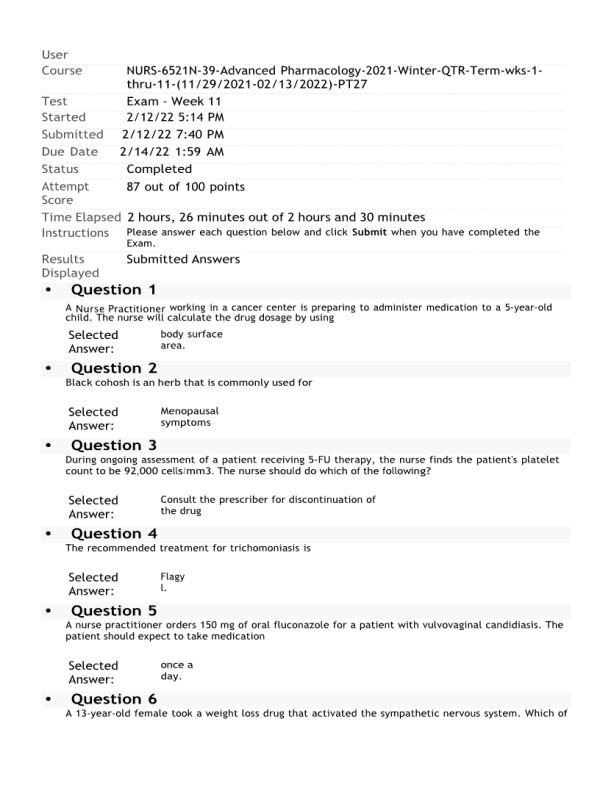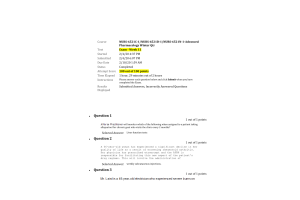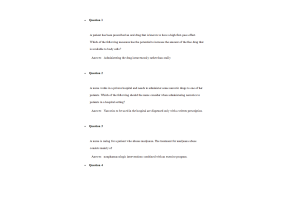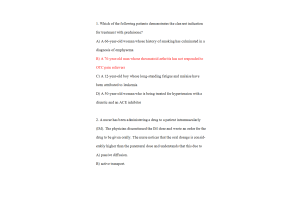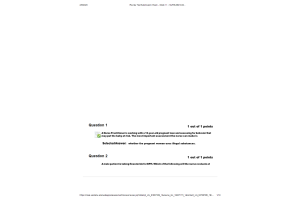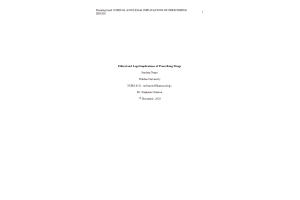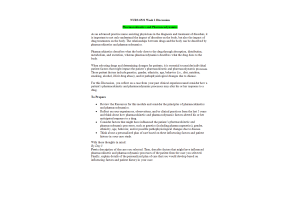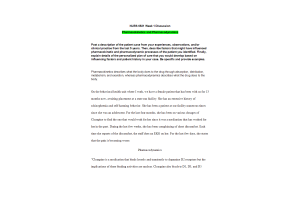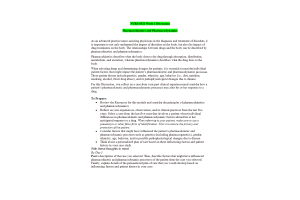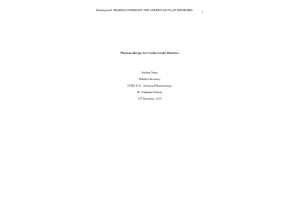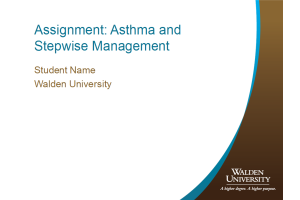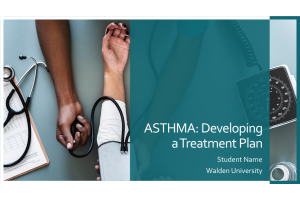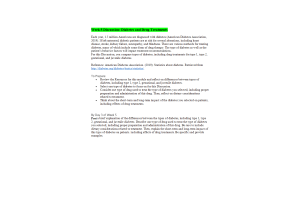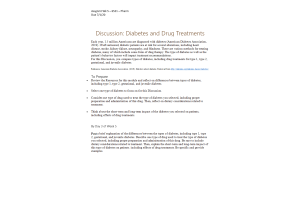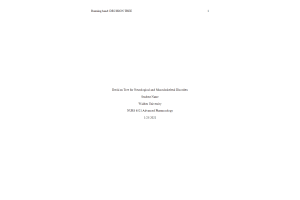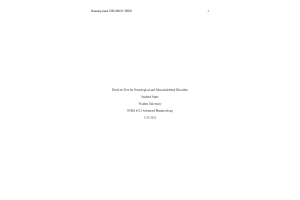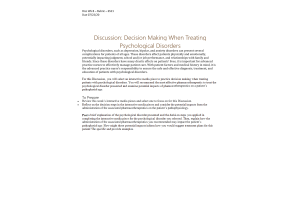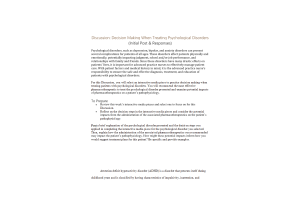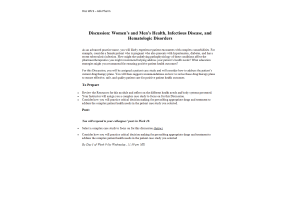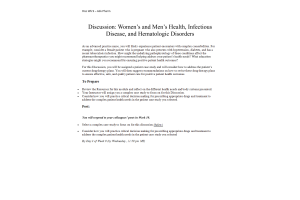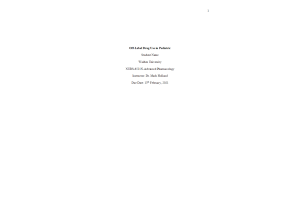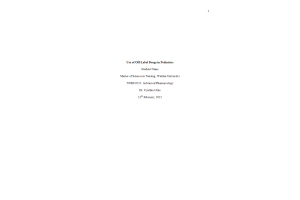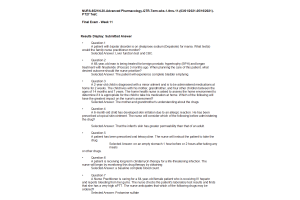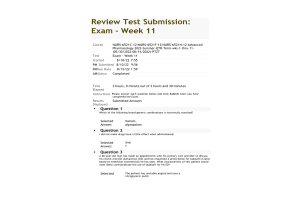NURS 6521N-39 Advanced Pharmacology Week 11 Final Exam
- $55.00
- Question: A Nurse Practitioner working in a cancer center is preparing to administer medication to a 5-year-old child. The nurse will calculate the drug dosage by using
- Question: Black cohosh is an herb that is commonly used for
- Question: During ongoing assessment of a patient receiving 5-FU therapy, the nurse finds the patient's platelet count to be 92,000 cells/mm3. The nurse should do which of the following?
- Question: The recommended treatment for trichomoniasis is
- Question: A nurse practitioner orders 150 mg of oral fluconazole for a patient with vulvovaginal candidiasis. The patient should expect to take medication
- Question: A 13-year-old female took a weight loss drug that activated the sympathetic nervous system. Which of the following assessment findings would the nurse expect?
- Question: What is the first line treatment for hypertension and a male with benign prosthetic hypertrophy?
- Question: All of the following systemic drugs interfere with metabolism of oral contraceptives except
- Question: A woman who is in the second trimester of her first pregnancy has been experiencing frequent headaches and has sought advice from her nurse practitioner about safe treatment options. What analgesic can the nurse most safely recommend?
- Question: A patient is prescribed ganciclovir to treat a CMV infection. An oral dosage is prescribed. To help increase bioavailability of the drug, the nurse will encourage the patient to take the medication
- Question: A 38-year-old pregnant patient admits to the Nurse Practitioner that she is an alcoholic and has been consuming alcohol during her pregnancy. The nurse knows that using alcohol during pregnancy may result in a child who presents with
- Question: A 3-year-old boy has developed otitis media and requires antibiotics. In order to increase the chance that the boy will take his prescribed medication, the nurse should
- Question: A patient is being seen in the emergency department for a sprained ankle and is given a drug to relieve pain. When a second dose of the pain medication is given, the patient develops redness of the skin, itching, and swelling at the site of injection of the drug. The most likely cause of this response is
- Question: A Nurse Practitioner educator who coordinates the staff education on an oncology unit is conducting an inservice on targeted therapies. What potential benefit of targeted therapies should the nurse highlight in this education session?
- Question: What schedule class of drug is Hydrocodone?
- Question: Autonomic Drugs are often using topical form for what purpose?
- Question: A Nurse Practitioner is going to administer medication to an infant using a medicine dropper. The best method is to open the child's mouth by gently squeezing the cheeks and placing the drops
- Question: A patient is taking etoposide for a testicular tumor refractory to treatment. The nursing assessment reveals that he is also taking warfarin. The nurse must carefully monitor for which of the following?
- Question: A Nurse Practitioner is working with a 57-year-old man who is a former intravenous drug abuser. He has been prescribed a weekly dosage of methotrexate for his rheumatoid arthritis. Which of the following will the nurse include in her teaching plan for this patient?
- Question: A 29-year-old pregnant patient is extremely upset about having to take medication for a pre-existing medical condition. She is consumed with fear that her baby will be born with a physical deformity or a congenital anomaly but knows that she has to take the medication. She talks constantly about this and is unable to sleep most nights. Which of the following is the most appropriate nursing diagnosis for this patient is?
- Question: A man is prescribed ciprofloxacin to treat a sexually transmitted infection. The nurse will instruct the patient to
- Question: A 72-year-old patient is prescribed ophthalmic ciprofloxacin for a bacterial infection in her right eye. The nurse will teach her to observe for which of the following adverse effects of the drug?
- Question: A Nurse Practitioner is instructing a 19-year-old female patient on the use of fluconazole for candida vaginitis. A teaching priority will be to
- Question: The Nurse Practitioner notices a cold sore on a patient's upper lip and requests medication; docosanol (Abreva) is ordered. Before applying the medication, the nurse would first
- Question: A Nurse Practitioner is caring for a patient with cancer who has been prescribed dronabinol (Marinol) to help reduce nausea and vomiting from chemotherapy. The nurse will inform the patient that he or she is taking an oral form of
- Question: A 71-year-old man has just been prescribed finasteride (Proscar). Which of the following complaints by this patient most likely indicated a need for this drug?
- Question: A 45-year-old woman with acute leukemia is going to begin chemotherapy with vincristine. The nurse is aware that vincristine must always be administered
- Question: The NP is teaching a patient about TMP/SMX before prescribing it to treat a UTI. Which statement by the patient indicates a need for further teaching?
- Question: A patient with non-Hodgkin's lymphoma (NHL) will be starting a course of doxorubicin shortly. When planning this patient's care, what nursing diagnosis should the nurse prioritize?
- Question: A 16-year-old boy is prescribed cromolyn sodium nasal spray to treat a nasal allergy. To maximize the therapeutic effects of the drug, which of the following will the nurse include in instructions to the patient?
- Question: A male patient is receiving heparin by continuous intravenous infusion. The nurse will instruct the patient and family members to report which of the following should it occur?
- Question: The clinical nurse educator who oversees the emergency department in a children's hospital has launched an awareness program aimed at reducing drug errors. What measure addresses the most common cause of incorrect doses in the care of infants and children?
- Question: A Nurse Practitioner is caring for a 10-year-old boy who complains of chronic headaches. His mother reports that she gives him Tylenol at least three times a day. Which of the following will the nurse work with the physician to evaluate?
- Question: An elderly woman is slated for a hemiarthroplasty (hip replacement surgery) after falling and breaking her hip on the stairs outside her home. The woman's pain in the time since her injury has been severe, and her care team has been treating it with morphine. Which of the following administration schedules is most likely to control the patient's pain?
- Question: The anticoagulant drug that acts as a vitamin K antagonist is:
- Question: After 6 months of unsuccessfully trying to conceive, a 31-year-old woman and her husband have sought a referral to a fertility specialist in order to explore their options. A nurse at the clinic should recognize that the woman may benefit from
- Question: A Nurse Practitioner has completed a medication reconciliation of a patient who has been admitted following a motor vehicle accident. Among the many drugs that the patient has received in the previous year is rituximab. The nurse would be justified in suspecting the patient may have received treatment for which of the following diseases?
- Question: The maximum amount of acetaminophen that can be taken per day is
- Question: A patient has endocarditis and is taking gentamicin. The Nurse Practitioner will be sure to monitor which of the following?
- Question: The NP student knows that which statement below accurately describes the activity of naloxone?
- Question: A 30-year-old woman who is in the first trimester of pregnancy has presented to her primary care provider with a 4-day history of a reddened, itchy left eye that is crusted with purulent exudate. The clinician suspects a bacterial, rather than viral, etiology. How will the patient's pregnancy affect the potential use of ciprofloxacin to treat her conjunctivitis?
- Question: A Nurse Practitioner is providing patient education to a 50-year-old woman who is taking methotrexate (MTX) for breast cancer. The nurse will instruct the patient to avoid which of the following drugs?
- Question: A patient has acquired primary hypogonadism and has been prescribed testosterone transdermal (Androderm) patches. When educating the patient on how to administer the drug, the nurse will instruct him to
- Question: A 51-year-old female patient has been receiving doxorubicin (Adriamycin) for metastatic breast cancer. Her medical record indicates she has cardiomyopathy and a cumulative dose of 300 mg/m2 of doxorubicin. Which of the following measures would help limit the severity of the cardiomyopathy in this patient?
- Question: A patient with AIDS has developed a number of secondary infections in recent weeks, including Kaposi's sarcoma. As a result of this most recent diagnosis, his care team has opted to begin treatment with interferon alfa-2a. The nurse is aware that this drug will address the etiology of Kaposi sarcoma by
- Question: An oncology nurse is reviewing the pathophysiology of cancer and is discussing with a colleague the factors that contribute to the success or failure of a patient's chemotherapy. Which of the following cancerous cells is most susceptible to the effects of chemotherapeutic drugs?
- Question: A school nurse has been teaching high school students about the risks associated with marijuana use. However, the nurse has been met with considerable skepticism on the part of students, most of whom believe that marijuana is a benign drug. Which of the following teaching points should the nurse provide?
- Question: A patient will soon begin targeted therapy as a component of her treatment plan for chronic leukemia. The nurse is conducting health education about this new aspect of the patient's drug regimen and the patient has asked about the potential side effects of treatment. How should the nurse best respond?
- Question: Which Of the following pharmacologic agents can be used to treat nicotine dependence/ smoking cessation?
- Question: Ms. Carter, a 48 year old female was placed on an aminoglycoside. The NP knows that an adverse reaction to aminoglycosides is?
- Question: A Nurse Practitioner is caring for a 46-year-old female patient who is taking paclitaxel for ovarian cancer. Two or three days after the infusion of the drug, the nurse must closely monitor for which of the following?
- Question: An oncology nurse is aware of the risks for injury that exist around the preparation, transportation, and administration of chemotherapeutic agents. In order to reduce these risks of injury, the nurse should take which of the following actions?
- Question: A male patient is taking finasteride for BPH. Which of the following will the nurse evaluate at each clinic visit?
- Question: A Nurse Practitioner is caring for a 64-year-old female patient who is receiving IV heparin and reports bleeding from her gums. The nurse checks the patient's laboratory test results and finds that she has a very high aPTT. The nurse anticipates that which of the following drugs may be ordered?
- Question: A 7-year-old child has been taking tetracycline for a bacterial infection. The nurse will be sure to inform the parents that this drug could cause
- Question: What schedule drug is alprazolam?
- Question: A 65-year-old woman has an advanced form of rheumatoid arthritis. Her treatment includes a regular dosage of methotrexate. The APRN will advise her to take which of the following vitamin supplements while taking the drug?
- Question: The NP is reviewing Mrs. Oglethorpe's medication list and recognizes that which drug listed below has been associated with increased risk for MI in women?
- Question: A contraindication to the use of combined contraceptives is:
- Question: A Nurse Practitioner is assigned to a patient who is at 32 weeks' gestation and is receiving terbutaline (Brethine) IV for 24 hours to control preterm labor. Which of the following nursing actions will the nurse take to decrease the risk of hypotension and promote circulation to the fetus?
- Question: Which of the following medication classes should be avoided and men with BPH
- Question: An NP is seeing a child who weights 25 pounds, 2 oz and needs a medication. The NP learns that the recommended dosing for this drug is 30-35 mg per kg per day in three divided doses. The NP should order
- Question: A Nurse Practitioner is assessing a patient who has chronic lymphoblastic myelogenous leukemia. The treatment plan includes hydroxyurea (Hydrea). The nurse will assess the patient for which of the following?
- Question: Phenytoin decreases folic acid absorption by
- Question: The NP recognizes that these medications are useful when taken during early symptoms of a migraine.
- Question: An older adult woman has been diagnosed with acute lymphoblastic leukemia (ALL) and her care team has identified potential benefits of imatinib. Which of the following characteristics of this patient's current health status may preclude the use of imatinib?
- Question: The NP has just placed Mr. Johnson on a selective serotonin reuptake inhibitor. What symptoms should be reviewed with the patient who is newly prescribed this class of medication?
- Question: An immune compromised patient in a critical care setting has developed a respiratory infection that has been attributed to methicillin-resistant Staphylococcus aureus (MRSA). The nurse should anticipate that the patient will require treatment with
- Question: Alprostadil (Caverject), a drug used to treat erectile dysfunction, has been prescribed to a 42-year-old patient. When providing education to the patient and his wife, the nurse should inform the wife about which of the following adverse effects?
- Question: The nurse practitioner, Jill, is deciding what medication to put her patient on. She recognizes that the mechanism of action of triptans is as:
- Question: The Nurse Practitioner knows that Buproprion use (wellbutrin, zyban) is contraindicated in which of the following instances?
- Question: A 34-year-old male has been diagnosed with TB and will be started on INH therapy. The medication history reveals that he currently takes antacids on a regular basis. The nurse will instruct the patient to take
- Question: What is the minimum inhibitory concentration (MIC)
- Question: A patient is receiving cefazolin in combination with anticoagulants. To minimize the adverse effects during therapy, the nurse will
- Question: Alendronate (Fosamax) is prescribed for a 67-year-old postmenopausal woman. In order to help prevent gastrointestinal distress, the nurse will advise the patient to
- Question: A male patient is experiencing climacteric symptoms secondary to androgen deficiency. His physician has prescribed testosterone. The nursing assessment reveals that the patient has had a myocardial infarction. The combination of testosterone therapy and a history of myocardial infarction would place that patient at a significantly higher risk of
- Question: The nurse practitioner orders Amoxicillin 500 mg tid? What is the total amount of medication patient will take per day?
- Question: A nurse practitioner has been assigned to a 55-year-old woman who has a malignant brain tumor. The patient is receiving her first dose of carmustine. It will be critical for the nurse to observe for which of the following?
- Question: y, the nurse practitioner is seeing Mr. Reynolds today. She would recognize that which of the following is a potential adverse side effects of autonomic-anticholinergic agents?
- Question: A 9-year-old boy was bought to his primary care provider by his mother with signs and symptoms of hookworm infection and will be sent home with a prescription for mebendazole. When provided patient and family education, the nurse should teach the mother with which of the following measures to avoid reinfection following treatment?
- Question: A Nurse Practitioner works at a weight management clinic. To which of the following overweight patients could the nurse safely administer dextroamphetamine?
- Question: A patient with chronic heart failure has begun treatment with epoetin alfa, which she will receive in her own home from a home health nurse. The nurse should teach the patient to supplement this treatment with a diet that is high in
- Question: A woman has a Chlamydia infection. Before initiating treatment with a tetracycline antibiotic, the NP should :
- Question: An immunocompromised cancer patient has developed cryptococcal meningitis and been admitted to the intensive care unit for treatment with amphotericin B. How should the nurse most safely administer this drug?
- Question: Which of the following would a Nurse Practitioner assess for in a patient who is taking polymyxin B systemically?
- Question: Which of the following medications will not increase the likelihood of photosensitivity?
- Question: All insects have an FDA black box warning regarding
- Question: A 35-year-old woman is on a weight-loss program and is to begin taking sibutramine (Meridia). After baseline physical data are obtained, the nurse will assess the patient's childbearing potential. The nurse will inform the patient that during sibutramine therapy she should
- Question: A 56-year-old woman will soon begin treatment of her overactive bladder with tolterodine (Detrol). What patient teaching should the nurse provide to this woman?
- Question: Off label prescribing is:
- Question: Ms. TW is a 47 year old female with known rheumatoidarthritis(RA).She wassplacedonprednisone5mgPOqd.In teachingthepatientabouthermedication,itwouldbeimportantforthenursepractitionertoincludewhatinformation?
- Question: A 6-month-old child has developed skin irritation due to an allergic reaction. He has been prescribed a topical skin ointment. The nurse will consider which of the following before administering the drug?
- Question: Jacob was eating cheese and drinking beer. Thirty minutes Later, he developed severe hypertension, diaphoresis, Flushing, and muscle rigidity. He may have been taken which drug?
- Question: A 15-year-old patient has meningitis caused by Haemophilus influenzae. She is being treated with chloramphenicol. The most important nursing action for this patient would be to monitor
- Question: Which of the following would the nurse include in a teaching plan about the signs and symptoms of thrombophlebitis and thromboembolism that should be reported by a patient taking estrogen?
- Question: A 73-year-old woman has osteoporosis and is prescribed alendronate. She takes calcium and vitamin D supplements, drinks lots of water, and has just quit smoking. The nurse should advise the patient to also
- Question: Which of the following patients will be at the greatest risk for anemia and would be the most likely candidate for epoetin alfa therapy?
- Question: A child is taking permethrin for head lice. The Nurse Practitioner will instruct her mother to
- Question: A 20-year-old woman has been prescribed estrogen. As with all women taking estrogen, the nurse will carefully monitor the patient for which of the following?
- Question: Combination OCs prevent pregnancy primarily by:
- Question: When completing this exam, did you comply with Walden University’s Code of Conduct including the expectations for academic integrity?
